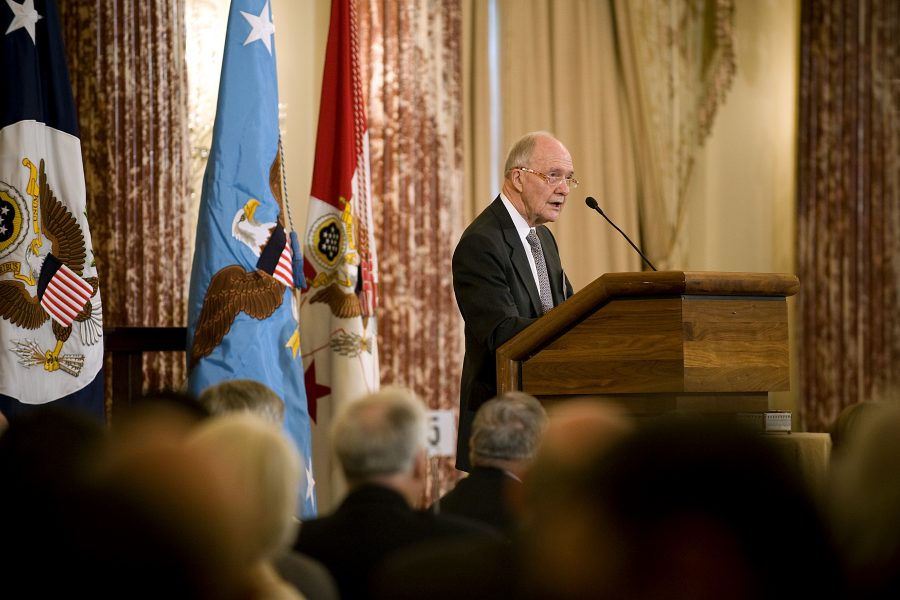Retired Air Force Lt. Gen. Brent Scowcroft, twice U.S. national security adviser, unelected statesman of international affairs, and adviser to six U.S. presidents, died Aug. 6 at age 95.
As a major general, Scowcroft was military assistant to President Richard M. Nixon, and as a three-star general, served Nixon as a deputy assistant for national security affairs. He was national security adviser to President Gerald R. Ford, and later to President George H.W. Bush, who he also served as chairman of the Foreign Intelligence Advisory Board. He aided President Barack H. Obama in choosing a national security team, and headed or served as a principal in many Washington, D.C., think-tanks over about 40 years.
Scowcroft promoted a “realist” U.S. foreign policy, weighted toward reliance on alliances and coalitions, and famously opposed the 2003 U.S. war in Iraq, although he remained on good terms with the White House following the invasion. He maintained collegial and cooperative relations with other advisers, and was skilled at building foreign policy consensus. He is credited with inclusion and building trust among the various elements of the foreign policy team, and transparency about goals, yet kept a low profile and did not publicly discuss his advice to the President.
Scowcroft attended the U.S. Military Academy and was commissioned into the Army in 1947, transferring to the Air Force when it became a separate service that year. He earned his wings in 1948, but after an accident took him off flying status, staff assignments dominated his career, which included working at times for the Joint Chiefs of Staff; Headquarters, U.S. Air Force; and the Office of the Assistant Secretary of Defense for International Security Affairs. Along the way he earned both a master’s degree and a doctorate in international relations from Columbia University. He taught at both West Point and the U.S. Air Force Academy.
After serving as Nixon’s military assistant, Scowcroft was made a deputy assistant for national security affairs, working with National Security Adviser Henry Kissinger, and replaced Kissinger in November 1975. He retired from the Air Force a month later, after 28 years of service.
In the George H.W. Bush White House, he helped manage U.S. policy regarding the collapse of the Warsaw Pact and Soviet Union. During the 1991 Gulf War, he advised Bush to end the conflict after Iraq was ejected from Kuwait, warning that to press on to Baghdad would lead to a long, open-ended and costly occupation that would hurt the U.S. financially and in terms of its international leadership. Though Bush later acknowledged being criticized for not “finishing the job,” Scowcroft’s advice proved prescient.
Scowcroft chaired or served on numerous blue-ribbon panels and presidential commissions regarding foreign policy. He was also vice-chairman of Kissinger Associates, founded the Forum for International Policy, and was president of The Scowcroft Group.
He supported the 2001 invasion of Afghanistan but opposed the 2003 invasion of Iraq, warning in a 2002 Wall Street Journal op-ed that it would hurt U.S. standing in the Middle East and international support for America’s war on terrorism. He later said that a premature withdrawal from Iraq before its new government was stable would turn into “a strategic defeat for American interests with potentially catastrophic consequences” for U.S. interests.
Scowcroft co-authored “A World Transformed” with former President George H.W. Bush about the end of Soviet communism, and, with President Jimmy Carter’s National Security Adviser Zbieniew Brzezinski and David Ignatius, “America and the World: Conversations on the Future of American Foreign Policy.”
President George H. W. Bush presented Scowcroft with the Medal of Freedom in 1991, and he was presented with over a dozen honorary doctorates during his career.
Editor’s Note: This story was updated at 4:31 p.m. EDT to include a tweet from Air Force Secretary Barbara M. Barrett.
